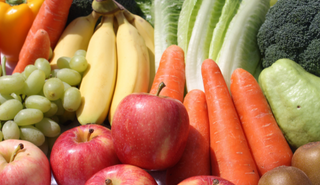Heating dilemma means less fruit and veg consumed - study
11 November 2022

People using prepayment energy meters consume less fruit and vegetables compared to those using alternative payment methods, according to new research.
The study, by academics at the Universities of Reading and East Anglia in the UK, and the University of Macedonia in Greece, explores the role of prepayment meters in the ‘heat-or-eat’ dilemma, a trade-off typically between paying for food or heating.
Households with prepaid meters typically pay more for their energy and the researchers found a strong link between this and lower consumption of fruit and vegetables – on average almost three fewer portions a week compared to those using alternative payment methods, such as direct debit.
The difference in consumption is roughly split between one fewer fruit and two fewer vegetables. The results, published in the journal Social Science & Medicine, suggest targeted support for prepayment users may have beneficial effects on people’s fruit and vegetable consumption patterns, and that this could be more effective in protecting women’s health in particular.
The study’s lead author Dr Andrew Burlinson, of UEA’s Norwich Business School, said: “Most importantly, our findings show that prepayment meters play a role in lower levels of fruit and vegetable consumption among potentially more vulnerable households. Short-term support is necessary but not sufficient to protect households from future energy price shocks. The UK government should develop strategies that could make a lasting difference to households."
Co-author of the study, Dr Cherry Law at the University of Reading added: “Policy instruments aimed at reducing energy demand, whilst ensuring energy services are affordable, may not only help vulnerable households, including prepayment meter users, achieve adequate levels of energy.
“They could also increase their resilience to future energy price volatility, reduce carbon emissions, and have the potential to improve the quality of diets and population health as a result.”
Food banks
According to the National Food Strategy only a quarter of the UK population meets the recommended consumption of fruit and vegetables - an important source of dietary fibre, minerals, and vitamins - despite the lower associated risk of morbidity and mortality.
Drawing on a sample of more than 24,800 people living in Great Britain, the analysis further reveals that prepayment meter users are not only less likely to meet the World Health Organisation's recommended ‘5-a-day’, but also more likely to use food banks, which often do not provide fruit and vegetables because of the cost and perishable nature of the goods, as well as demand, with households relying on cold boxes and kettle boxes that either do not need cooking or only need hot water from a kettle.
The researchers say the heat-or-eat dilemma has resurfaced during the ongoing energy price crisis and warn it has the potential to worsen diet quality among the UK population if expenditure on healthy food is traded-off for energy consumption.
To help address this, the study makes four key policy recommendations, including allocating financial support to prepayment meter users via channels likely to increase fruit and vegetable consumption. For example, public health initiatives, such as the Healthy Start Scheme or Best Start Foods, may be expanded to include vulnerable prepayment meter users.
Targeted support measures are necessary as they may increase healthy food choices, in particular fruit and vegetables, for those more vulnerable; this may be viewed as a preventable measure from a public health perspective as healthier food has the potential to reduce cardiovascular disease, cancer, and premature mortality risks.
‘Pay (for it) as you go: Prepaid energy meters and the heat-or-eat dilemma’, Andrew Burlinson, Apostolos Davillas and Cherry Law, is published in Social Science & Medicine.

